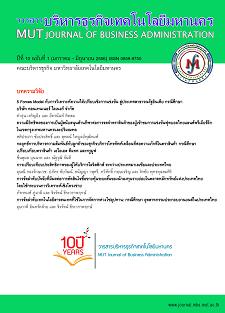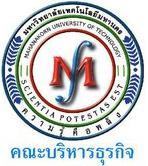กลยุทธ์การบริหารความสัมพันธ์กับลูกค้าของธุรกิจบริการโทรศัพท์เคลื่อนที่ต่อความภักดีในตราสินค้า กรณีศึกษา เปรียบเทียบตราสินค้า เอไอเอส ดีแทค และทรูมูฟ
Keywords:
กลยุทธ์การบริหารความสัมพันธ์กับลูกค้า (CRM), ความภักดีในตราสินค้า, จุดสัมผัสทางการสื่อสารการตลาดแบบบูรณาการ, Customer Relationship Management (CRM), Customer Loyalty, Integrated Marketing Communication Touch PointsAbstract
งานวิจัยนี้มีวัตถุประสงค์เพื่อเปรียบเทียบระดับความสัมพันธ์กับลูกค้าในโปรแกรม AIS Plus ของเอไอเอส, ใจดีของดีแทค และ TRUE - Privilege ของทรูมูฟที่มีต่อความภักดีในตราสินค้า อีกทั้ง เพื่อศึกษาการรับรู้ของผู้ใช้บริการต่อกลยุทธ์ CRM ผ่านจุดสัมผัสการสื่อสารการตลาดแบบบูรณาการ โดยใช้แบบสอบถามกับกลุ่มตัวอย่างจำนวน 452 คนในเขตกรุงเทพมหานคร และ การสนทนากลุ่มกับผู้ที่ใช้โทรศัพท์เคลื่อนที่ของทั้ง 3 รายเพื่อให้ได้ข้อมูลพฤติกรรมในเชิงลึก สถิติที่ใช้ในการวิเคราะห์ข้อมูล ได้แก่ ค่าร้อยละ ค่าเฉลี่ย ค่าเบี่ยงเบนมาตรฐาน การทดสอบความแตกต่างระหว่างค่าเฉลี่ยสองกลุ่ม (T-test) และการทดสอบค่าสัมประสิทธิ์สหสัมพันธ์เพียร์สัน (Pearson Analysis) แบบรายคู่ (Bivariate Correlation) ผลการวิจัยพบว่า เป็นเพศชายจำนวน 239 คน เพศหญิง 213 คน มีอายุระหว่าง 26 - 30 ปี มีการศึกษาระดับปริญญาตรี เป็นพนักงานบริษัทเอกชน และมีรายได้เฉลี่ยต่อเดือน 10,001 - 20,000 บาท เลือกใช้บริการแบบเติมเงิน โดยมีอัตราการใช้งานต่อเดือนน้อยกว่า 500 บาท ส่วนใหญ่ใช้งานในเครือข่ายของตนเป็นเวลา 1 - 4 ปี โดย เอไอเอส เป็นเครือข่ายที่มีคนอยากใช้มากที่สุด มีการรับรู้ต่อ กลยุทธ์ CRM ผ่านสื่อโทรทัศน์และติดต่อกลับผ่าน Call Center มากที่สุด โดยมีตัวเองเป็นผู้ตัดสินใจเลือกใช้บริการและให้ความสำคัญถึงประสิทธิภาพของเครือข่ายเป็นลำดับแรก ผลการทดสอบสมมติฐานพบว่า กลยุทธ์ CRM กับลูกค้าของผู้ประกอบการที่แตกต่างกันมีผลต่อระดับความภักดีของผู้ใช้บริการที่ต่างกัน และเมื่อวิเคราะห์โดยใช้ความสัมพันธ์แบบรายคู่กับกลยุทธ์ CRM 5 องค์ประกอบ ได้แก่ คุณค่าด้านผลิตภัณฑ์ การบริการ บุคลากร ภาพลักษณ์และการตอบสนองความคาดหวังของลูกค้า ที่มีต่อระดับความภักดีในตราสินค้าใน 5 องค์ประกอบ ได้แก่ การบอกต่อ ความไม่อ่อนไหวต่อราคา ความชอบมากกว่า ความผูกพันกับตราสินค้า และ สะท้อนความเป็นตัวตน ของทั้ง 3 เครือข่าย พบว่า เอไอเอส อยู่ในระดับสูง รองลงมาเป็นดีแทค และทรูมูฟตามลำดับ นอกจากนี้ เพศ มีความสัมพันธ์ต่อการรับรู้กลยุทธ์ CRM ผ่านทางเว็บไซต์ ส่วนอายุมีความสัมพันธ์ต่อการรับรู้กลยุทธ์ CRM ผ่านทางวิทยุป้ายประชาสัมพันธ์ เว็บไซต์ และ Call Center การศึกษามีความสัมพันธ์กับป้ายประชาสัมพันธ์ เว็บไซต์ สื่อสังคมออนไลน์และ SMS/MMS อาชีพมีความสัมพันธ์กับป้ายประชาสัมพันธ์ เว็บไซต์ สื่อสังคมออนไลน์ Call Center และสำนักงานบริการลูกค้าThe Comparison of CRM Strategies in Mobile Phone Providers Effecting on Customer Loyalty: The Case Study of AIS, DTAC and TRUEMOVE
The Comparison of CRM Strategies in Mobile Phone Providers effecting on Customer Loyalty: The case study of AIS DTAC and TRUEMOVE has two objectives. The first objective is to compare the CRM strategies of three mobile phone operators in Thailand, namely, the AIS Plus program, the Jai Dee program of DTAC and the True Privilege of True-move. The second objective is to study the CRM perception of customers through the Integrated Marketing Communication (IMC) touch points. The questionnaires were collected with 452 mobile phone users in Bangkok metropolitan. In addition, focus group interviews of three mobile phone providers were also conducted in order to elicit more customer insights. Percentage, mean, standard deviation, the t-test and Pearson analysis in bivariate correlation were applied as the statistical analysis tools. The research finding showed that the samples were comprised of 239 males and 213 females. The majority of them were aged between 26-30 years old and graduated with a bachelor’s degree and worked for private companies. They had an income of 10,001-20,000 baht per month and spent in mobile phone usage less than 500 baht per month which stayed in their networks for 1-4 years. AIS became the most favorite network. TV was the popular IMC touch points and call center was the admired feedback. The majority of them chose mobile phone providers by themselves and gave the priority to the network efficiency. The hypothesis results revealed that CRM strategies of three mobile phone providers were significantly correlated with customer loyalty. By the bivariate correlation, the CRM satisfactions in 5 aspects such as the product value, the service value, the people value, the image value and the customer expectation value were matched with customer loyalty in 5 aspects such as the word of mouth communication, the price tolerance, the preference, the brand commitment and the brand identity. The overall CRM satisfaction variables of AIS Company showed significant correlations with brand loyalty. Moreover, sex significantly correlated only with websites. Age, on the other hand, significantly correlated with radio, billboards, websites and call centers. Education also significantly correlated with billboards, websites, social media and SMS/MMS. Likewise, careers significantly correlated with billboards, websites, social media, call centers and counter services
Downloads
Issue
Section
License
ข้อความ ข้อคิดเห็น ข้อมูล เนื้อหา รูปภาพ แผนภูมิ แผนผัง เป็นต้น ที่ปรากฏและแสดงในบทความต่างๆ ในวารสารบริหารธุรกิจเทคโนโลยีมหานคร ถือเป็นความรับผิดชอบโดยตรงของผู้เขียนบทความนั้นๆ มิใช่เป็นความรับผิดชอบใดๆ ของวารสารบริหารธุรกิจเทคโนโลยีมหานคร และมหาวิทยาลัยเทคโนโลยีมหานคร
บทความที่ตีพิมพ์ในวารสารบริหารธุรกิจเทคโนโลยีมหานคร ถือเป็นลิขสิทธิ์เฉพาะของคณะบริหารธุรกิจ มหาวิทยาลัยเทคโนโลยีมหานคร หากบุคคลหรือหน่วยงานใดต้องการนำทั้งหมดหรือส่วนใดส่วนหนึ่งไปเผยแพร่ต่อหรือเพื่อกระทำการใดๆ จะต้องได้รับการอนุญาตเป็นลายลักษณ์อักษรจากคณะบริหารธุรกิจ มหาวิทยาลัยเทคโนโลยีมหานครก่อนเท่านั้น


